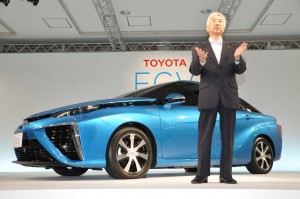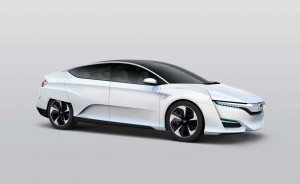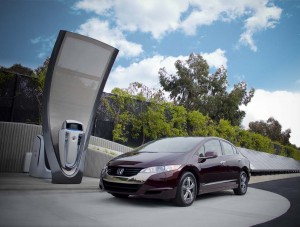Honda’s new fuel-cell vehicle has fallen victim to the maker’s airbag safety problems. With key engineering talent diverted to deal with the exploding Takata airbag issue, Honda won’t launch the production version of the new FCV model until early in 2016, senior company officials revealed.
But a near-production concept version of the new fuel-cell vehicle will still make its debut at the upcoming Detroit Auto Show.
It will show “the styling evolution” that has taken place since Honda first showed off its FCV Concept at the Tokyo Motor Show in late 2012, said John Mendel, Honda’s top U.S. executive.
Honda was the first automaker to commercially offer a hydrogen-powered vehicle, offering a limited number of leases for the FCX fuel-cell vehicle in late-2002. In the U.S., the fuel-cell vehicles was limited to a small number of dealers in Southern California, the only part of the country where hydrogen was commercially available.
(Audi combines fuel-cell and plug-in to create concept A7 h-tron. Click Here to check it out.)
Fuel-cell technology began to fall out of favor later in the decade, attention shifting to battery-electric technology. But hydrogen has begun regaining interest, in part due to the limits of lithium-ion batteries, notably their high cost, limited range and long charging times.

Mitsuhisa Kato, Toyota Motor Corp. executive vice president, revealing the the first prototype of the FCV fuel cell vehicle in Japan in 2012.
Proponents of hydrogen power note that the technology can offer as much as 300 miles of range, fill-up times competitive with that of a gasoline-powered vehicle, and good performance. Costs have meanwhile begun to drop, while there are major efforts underway to expand the fuel’s availability.
The State of California has set aside millions of dollars to establish a network of hydrogen pumps, and private programs are also underway. Honda, for example, will contribute $13.8 million to FirstElement Fuel, which is setting up a hydrogen distribution system. Advocates say that the availability of new fuel-cell vehicles, that will break the classic chicken-and-egg problem.
Hyundai began offering a fuel-cell version of its Tucson sport-utility vehicle last summer, and Toyota is launching its new Mirai model in Japan this month, with U.S. sales set to begin in mid-2015.
(VW adds HyMotion fuel-cell option to Golf line. Click Here for the story.)
Honda had also hoped to be back on the market with a production version of the FCV Concept about the same time. But several company insiders have told TheDetroitBureau.com that key members of the FCV development team, including the project’s chief engineer, have been pulled off the program, reassigned to handle Honda’s airbag issues.
The third-largest of the Japanese automakers, Honda is the largest customer of Takata, an embattled supplier of airbags now blamed for at least five deaths, most in Honda vehicles. An apparent manufacturing defect can cause the bags to explode when triggered by a vehicle crash, sending shrapnel into the passenger compartment.
In October, the National Highway Traffic Safety Administration called for a recall of 7.8 million vehicles using the Takata airbags, focusing on areas of high humidity that appears to worsen the problem. But NHTSA has since demanded the recall be expanded nationwide. While Takata has balked, Honda has agreed to the safety agency’s demands.
(For more on Toyota’s fuel-cell vehicle plans, Click Here.)
While the personnel shift has created delayed for the Honda FCV program, the project is far from derailed. Honda still plans to bring the first of the new hydrogen cars to market in Japan in March 2016, and will launch sales in the U.S. shortly afterwards.
The maker isn’t saying whether it will again limit retail availability to lease customers or will sell the vehicle outright. Also unclear is whether it will include unlimited fuel supplies in the base price, as Hyundai has done.



How timely… We were discussing the airbag/seatbelt/safety capsules today that will be required for autonomous vehicles as seating positions will be counter to the direction of vehicle motion in many instances. This presents a whole new world of safety challenges/standard requirements to protect passengers in collisions.